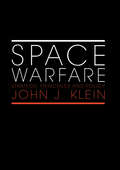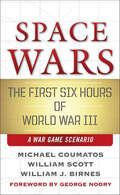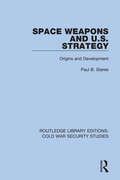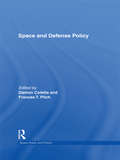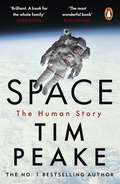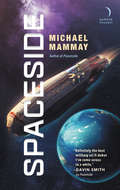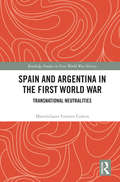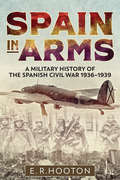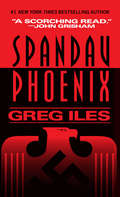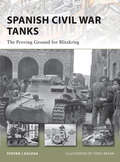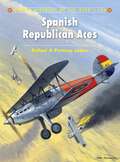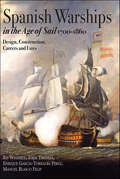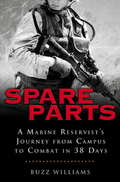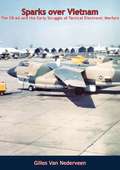- Table View
- List View
Space Warfare in the 21st Century: Arming the Heavens (Cass Military Studies)
by Joan Johnson-FreeseThis book examines the recent shift in US space policy and the forces that continually draw the US back into a space-technology security dilemma. The dual-use nature of the vast majority of space technology, meaning of value to both civilian and military communities and being unable to differentiate offensive from defensive intent of military hardware, makes space an area particularly ripe for a security dilemma. In contrast to previous administrations, the Obama Administration has pursued a less militaristic space policy, instead employing a strategic restraint approach that stressed multilateral diplomacy to space challenges. The latter required international solutions and the United States, subsequently, even voiced support for an International Code of Conduct for Space. That policy held until the Chinese anti-satellite (ASAT) test in 2013, which demonstrated expanded Chinese capabilities. This volume explores the issues arising from evolving space capabilities across the world and the security challenges this poses. It subsequently discusses the complexity of the space environment and argues that all tools of national power must be used, with some degree of balance, toward addressing space challenges and achieving space goals. This book will be of much interest to students of space policy, defence studies, foreign policy, security studies and IR.
Space Warfare: Strategy, Principles and Policy (Space Power and Politics)
by John J. KleinThis new study considers military space strategy within the context of the land and naval strategies of the past. Explaining why and how strategists note the similarities of space operations to those of the air and naval forces, this book shows why many such strategies unintentionally lead to overemphasizing the importance of space-based offensive weaponry and technology. Counter to most U.S. Air Force doctrines, the book argues that space-based weapons don’t imbue superiority. It examines why both air and naval strategic frameworks actually fail to adequately capture the scope of real-world issues regarding current space operations. Yet by expanding a naval strategic framework to include maritime activities—which includes the interaction of land and sea—the breadth of issues and concerns regarding space activities and operations can be fully encompassed. Commander John Klein, United States Navy, uses Sir Julian Corbett’s maritime strategy as a strategic springboard, while observing the salient lessons of other strategists—including Sun Tzu, Clausewitz, Jomini, and Mao Tse-tung—to show how a space strategy and associated principles of space warfare can be derived to predict concerns, develop ideas, and suggest policy not currently recognized. This book will be of great interest to all students and scholars of military and strategic studies and to those with an interest in space strategy in particular.
Space Warfare: Strategy, Principles and Policy (Space Power and Politics)
by John J. KleinThis book examines military space strategy within the context of the land and naval strategies of the past. This second edition has been updated and revised, with several new chapters included.The book examines competition and conflict in the space domain, including the methods used and sound counterstrategies to thwart a competitor’s efforts. Contrary to many spacepower pundits, the book explains that neither is the space domain inherently offense-dominant nor is there a first-mover advantage when incorporating a sound space strategy. Offering new insights into the nature of strategic competition in space, this second edition leans heavily on the British maritime experience and the work of Julian Corbett to provide a strategic framework for understanding competition, crisis, and conflict in the space domain. It also includes important concepts from leading theorists and strategists, both past and present, to amplify concepts and provide additional insights into the functioning of space strategy. The book provides a foundational framework by underscoring that space strategy is shaped by the fundamental nature of all warfare, along with the universal principles of strategy and the essential unity of all strategic experience. Warfare is warfare, no matter the domain of operations, and consequently, policymakers and military leaders can look to historical experience and knowledge of past strategic frameworks to help gain insights into the functioning of space warfare.This book will appeal to students of spacepower, defense and strategic studies, and International Relations.
Space Wars: The First Six Hours of World War III, a War Game Scenario
by William J. Birnes William Scott Michael CoumatosMichael J. Coumatos is a former U.S. Navy test pilot, ship's captain, and commodore; U.S. Space Command director of wargaming; and a government counterterrorism advisor. William Scott is a retired bureau chief of Aviation Week and Space Technology and a nine-year Air force veteran who served as aircrew on nuclear sampling missions. He is a six-time Royal Aeronautical Society "Journalist of the Year" finalist, and won the Society's 1998 Lockheed Martin Award for the "Best Defense Submission." He also received both the 2006 and 2007 Messier-Dowty awards for "Best Airshow Submission." With the help of New York Times bestselling author William J. Birnes, these renowned experts have joined forces to grippingly depict how the first hours of World War III might play out in the year 2010.Coumatos, Scott, and Birnes take the reader inside U.S. Strategic Command, where top military commanders, space-company executives, and U.S. intelligence experts are conducting a DEADSATS II wargame, exploring how the loss of critical satellites could lead to nuclear war. The players don't know that the war they are gaming has already begun, miles above them in the lifeless, silent cold of space. Jam-packed with the actual systems and secret technologies the United States has or will soon field to protect its space assets, Space Wars describes a near-future nuclear nightmare that terrorists will relish but politicians prefer to ignore. In a quieter, more peaceful time, Space Wars would be an exciting work of fiction. But with the United States now at war, Space Wars is all too real. .At the Publisher's request, this title is being sold without Digital Rights Management Software (DRM) applied.
Space Weapons Earth Wars
by Dana J. Johnson Michael D. Miller Robert Preston Sean J. Edwards Calvin ShipbaughThis overview aims to inform the public discussion of space-based weapons by examining their characteristics, potential attributes, limitations, legality, and utility. The authors do not argue for or against space weapons, nor do they estimate the potential costs and performance of specific programs, but instead sort through the realities and myths surrounding space weapons in order to ensure that debates and discussions are based on fact.
Space Weapons and U.S. Strategy: Origins and Development (Routledge Library Editions: Cold War Security Studies #58)
by Paul B. StaresThis book, first published in 1985, analyses the factors that have shaped the militarization of space. By examining in great detail the determinants of U.S. policy, it explains why for over 25 years space did not become the scene of an arms race, and why this began to change in the late 1970s. Both superpowers did, however, develop a limited anti-satellite capability in the 1960s, and these programmes are also discussed.
Space and Defense Policy (Space Power and Politics)
by Damon Coletta Frances T. PilchThis edited volume introduces the reader to the role of space in military and defense strategy, and outlines some of the major foreign and domestic actors in the space arena, as well as constraints of law and treaties on activities in space. It also addresses science and technology as they relate to space policy. The book addresses three main questions: How does the realm of space fit into strategic thinking about national security? How does policy regarding space develop and what considerations, both in the United States and abroad, figure prominently in calculations about space policy? How do different states/nations/actors regard the role of space in their national security calculations and how do these policies impact each other? This book fills a niche in the space policy field, providing insights into space and strategy from international experts from the military, academic and scientific communities. A unique feature of the book is the chapter on science and technology, which utilizes the latest information available concerning space utilization and exploration.
Space as a Strategic Asset
by Joan Johnson-FreeseJoan Johnson-Freese argues that the race for space weapons and the U.S. quest for exclusive or at least dominant ownership of strategic space assets have alienated the very allies that the United States needs in order to maintain its leading role in space exploration. Taking a balanced look at the issues that have contributed to the decline of America's manned space program, such as lack of political support and funding, Johnson-Freese offers not only a critique but also a plan for enhancing U.S. space security through cooperation rather than competition.She begins with a brief overview of the history of international space development through four eras: before Sputnik, the space race, after Apollo, and globalization. Then she focuses on how policy changes of the mid-1990s have changed the nation, examining why the United States has grown obsessed with the development of space technology not just as a tool for globalization but as a route toward expanding an already dominant arsenal of weapons. Johnson-Freese claims that these policy choices have greatly affected the attitudes and actions of other countries, and in the fight to achieve security, the United States has instead put itself at greater peril.Johnson-Freese explains complex technical issues in clear, accessible terms and suggests a way forward that is comprehensive rather than partisan. America is not the only country with space ambitions, but it is unique in viewing space as a battlefield and the technological advancements of other nations as a dire threat. Urgent and persuasive, Space as a Strategic Asset underscores the danger of allowing our space program to languish and the crucial role of cooperation in protecting the security of our country and the world.
Space: A thrilling human history by Britain's beloved astronaut Tim Peake
by Tim PeakeFrom bestselling author and British astronaut Tim Peake, an inspirational human history of space travel, from the Apollo missions to our future forays to Mars. The Right Stuff for a new generation.'This book is brilliant - once in a blue moon. A book for the whole family.' Chris Evans, Virgin Radio'The most wonderful book ... Tim Peake is a historian and encyclopaedia of space.’ Rory Stewart'An extraordinary book. For anyone - even if you’re not interested in Space. If you’re interested in human stories and the human character - this is delightful.' BBC Breakfast'A fascinating, detailed, playful book drawn from extensive research – Peake met seven Apollo astronauts, Russian cosmonauts and various other space technicians – as well as his considerable personal experience. Lifts the lid on what space is like: the dedication and sacrifice; the politics and pantomime; the practicalities and the peril; the glory and fame; the adjustment back to normal life.' iPaper'A thrilling human history of space' Daily Mirror'The bible of space travel' Chris Moyles, Radio XAs seen in the major TV series Secrets of Our Universe with Tim Peake.Only 656 people in human history have left Earth. In Space: The Human Story, astronaut Tim Peake traces the lives of these remarkable men and women who have forged the way, from Yuri Gagarin to Neil Armstrong, from Valentina Tereshkova to Peggy Whitson.Full of exclusive new stories, and astonishing detail only an astronaut would know, the book conveys what space exploration is really like: the wondrous view of Earth, the surreal weightlessness, the extraordinary danger, the surprising humdrum, the unexpected humour, the newfound perspective, the years of training, the psychological pressures, the gruelling physical toll, the thrill of launch and the trepidation of re-entry. The book also examines the surprising, shocking and often poignant stories of astronauts back on Earth, whose lives are forever changed as they readjust to terra firma.Publication of the book comes on the eve of NASA's plans to return to the moon, fifty years after an astronaut last walked on the lunar surface. In 2024 the Artemis II mission will send four astronauts to orbit the moon. In 2025 Artemis III will send the first woman and the first person of colour to step on the lunar surface. What will separate these upcoming moonwalkers from the legendary Apollo crews? Does it still take a daring-do attitude, super-human fitness, intelligence, plus the 'Right-stuff' - a fabled grace under pressure? And how will astronauts travel even further - to Mars and beyond? Space: The Human Story reveals all.
Spacehawks: Family Business
by Ed SutterWhen a luxury spaceliner is hijacked in the Bishti sector, sets in motion are a series of events that could well lead to interstellar war. A Senator from the Confederation, along with his wife, are among the passengers taken hostage. Jason Hawke, former Confederation Marine, is awakened from an alcoholic cycle of self-destruction and spurred to go to the rescue of the woman he once loved, Kristin Baird, the wife of the Senator. Meanwhile, agencies within the Confederation and the Confed Navy are making plans to go to the rescue of the hostages, little knowing that the rival DeSotoan Empire is laying an ambush for them, using the hostages as bait. But when Jason is joined by his three brothers and a beautiful fighter pilot, the hostage takers may find out that they've bitten off much more than they can chew. After all, violence is the Hawke clan's family business!
Spaceside (Planetside #2)
by Michael MammayFrom the author of Planetside, a Best Book of 2018 (Library Journal) A military legend is caught in the web between alien intrigue and human subterfuge…Following his mission on Cappa, Colonel Carl Butler returns to a mixed reception. To some he is a do-or-die war hero. To the other half of the galaxy he’s a pariah. Forced into retirement, he has resettled on Talca Four where he’s now Deputy VP of Corporate Security, protecting a high-tech military company on the corporate battlefield—at least, that’s what the job description says. Really, he’s just there to impress clients and investors. It’s all relatively low risk—until he’s entrusted with new orders. A breach of a competitor’s computer network has Butler’s superiors feeling every bit as vulnerable. They need Butler to find who did it, how, and why no one’s taken credit for the ingenious attack.As accustomed as Butler is to the reality of wargames—virtual and otherwise—this one screams something louder than a simple hack. Because no sooner does he start digging when his first contact is murdered, the death somehow kept secret from the media. As a prime suspect, he can’t shake the sensation he’s being watched…or finally succumbing to the stress of his past. Paranoid delusion or dangerous reality, Butler might be onto something much deeper than anyone imagined. But that’s where Butler thrives.If he hasn’t signed his own death warrant.
Spain and Argentina in the First World War: Transnational Neutralities (Routledge Studies in First World War History)
by Maximiliano Fuentes CoderaThis is the first book that analyzes the transnational impact of the Great War simultaneously on two countries, Spain and Argentina, that remained neutral throughout the conflict. Both countries were very relevant in the conception of propaganda and policies of belligerent countries such as France, Germany and Great Britain and showed that the conflict had a global influence and affected deeply local political and cultural processes, even in areas geographically distant from the trenches. Within this framework, this book is focused on three aspects that are analyzed dynamically throughout the whole war from a transnational perspective: neutrality as a space of dispute between pro-Allies and pro-German sectors and its relation with local politics, the debate about what positions should be assumed in order to guarantee a world without war, and the polemics on the ideas of nations and supra-nations (Hispanism, Latinism, Pan-Americanism). The conclusions of the book highlight that the radicalization that exploded in 1917 in both countries was fundamental in shaping the political radicalization of the last months of the conflict and the postwar period. As happened in Europe, the Great War did not finish in 1918 and its traces continued in the 1920s and 1930s.
Spain and the American Revolution: New Approaches and Perspectives
by Gabriel Paquette Gonzalo M. Quintero SaraviaThough the participation of France in the American Revolution is well established in the historiography, the role of Spain, France’s ally, is relatively understudied and underappreciated. Spain's involvement in the conflict formed part of a global struggle between empires and directly influenced the outcome of the clash between Britain and its North American colonists. Following the establishment of American independence, the Spanish empire became one of the nascent republic's most significant neighbors and, often illicitly, trading partners. Bringing together essays from a range of well-regarded historians, this volume contributes significantly to the international history of the Age of Atlantic Revolutions.
Spain in Arms: A Military History of the Spanish Civil War, 1936–1939
by E. R. HootonSpain in Arms is a military history of the Spanish Civil War. It examines how the Spanish Civil War developed on the battlefield through the prism of eight campaigns between 1937-1939 and shows how many accounts of military operations during this conflict are based upon half-truths and propaganda. The book is based upon nearly 60 years of extensive research into the Spanish Civil War, augmented by information from specialized German, Italian and Russian works. The Italian campaign against the Basques on the Northern Front in 1937 was one of the most spectacular Nationalist successes of the Civil War, with 60,000 prisoners taken. This is also the first book to quote secret data about Italian air operations intercepted by the British. The figures intercepted by the British show the Italians flew 1,215 sorties and dropped 231 tons of bombs during the campaign, whilst also suffering the heaviest losses. It also demonstrates how the Nationalists won not simply by benefitting from a cornucopia of modern arms from the Fascist powers but by using its limited resources to maximum effect. Spain in Arms reveals the Nationalist battlefield superiority in terms of training and overall command, and the Republic's corresponding weaknesses in the same fields. The Republican Brunete and Belchite offensives of 1937 are described in detail, from the weapons they carried and the tactics they employed to the dynamic Nationalist response and reaction of the generals. This book also explores how the extent of foreign intervention on both sides has been greatly exaggerated throughout history and provides the first accurate information on this military intervention, using British and French archives to produce a radically different but more accurate account of the battles and the factors and men who shaped them. Hooton finally gives the historical context and operational implications of the battlefield events to provide a link between the First and Second World Wars.
Spain, the Second World War, and the Holocaust: History and Representation (Toronto Iberic)
by Gina Herrmann Sara J. BrenneisSpain has for too long been considered peripheral to the human catastrophes of World War II and the Holocaust. This volume is the first broadly interdisciplinary, scholarly collection to situate Spain in a position of influence in the history and culture of the Second World War. Featuring essays by international experts in the fields of history, literary studies, cultural studies, political science, sociology, and film studies, this book clarifies historical issues within Spain while also demonstrating the impact of Spain's involvement in the Second World War on historical memory of the Holocaust. Many of the contributors have done extensive archival research, bringing new information and perspectives to the table, and in many cases the essays published here analyze primary and secondary material previously unavailable in English. Spain, the Second World War, and the Holocaust reaches beyond discipline, genre, nation, and time period to offer previously unknown evidence of Spain’s continued relevance to the Holocaust and the Second World War.
Spandau Phoenix: A Novel (World War Two #2)
by Greg IlesThe New York Times No. 1 bestseller delivers 'a scorching read' (John Grisham). <P> One of the great unsolved mysteries of World War II is - to some people - a secret worth killing for... The Spandau Diary - what was in it? Why did the secret intelligence agencies of every major power want it? Why was a brave and beautiful woman kidnapped and sexually tormented to get to it? Why did a chain of deception and violent death lash out across the globe, from survivors of the Nazi past to warriors in the new conflict now about to explode? Spandau Phoenix is a page-turning, pulse-pounding thriller, already hailed as a classic.
Spanish Civil War Tanks: The Proving Ground for Blitzkrieg
by Steven Zaloga Tony BryanThe tanks used during the Spanish Civil War are not often examined in any great detail, and are often labeled as little more than test vehicles in a convenient proving ground before World War II. But, with groundbreaking research, armor expert Steven J Zaloga has taken a fresh look at the tanks deployed in Spain, examining how future tanks and armored tactics were shaped and honed by the crews' experiences, and how Germany was able to benefit from these lessons while their Soviet opponents were not. Based on recently uncovered records of Soviet tankers in Spain and rare archival accounts, this book describes the various tanks deployed in Spain, including the PzKpfw I and the T-26. From the Trade Paperback edition.
Spanish Guerrillas in the Peninsular War 1808-14
by Richard Hook Rene ChartrandConstant Spanish guerrilla activity so drained the resources and diverted the attention of the French military that Wellington was able to advance against and overcome a numerically superior enemy. So many French soldiers were being used to counter the guerrillas and the threat that they posed that less than a third of the French army could be tasked with confronting Wellington. This book brings to life, for the first time, the formation, tactics and experiences of the Spanish guerrilla forces that fought Napoleon's army during the Peninsular War (1808-1814). Using much previously unpublished material, it offers a vivid description of the guerrilla and his lifestyle.
Spanish Mission Churches of New Mexico [Illustrated Edition]
by Le Baron Bradford PrinceIncludes 62 IllustrationsTHERE is no series of structures in the United States that possesses such interest as the old Missions of California. Whether intact, or partially restored, or in ruins, they have an attraction and a charm that are unequalled.Bradford Prince (1840-1922) took his law degree from Columbia University in 1866. He was a delegate to the Republican National Convention of 1876, where he supported Rutherford B. Hayes over Roscoe Conkling. He turned down an appointment as territorial governor of Idaho, instead becoming chief justice of the New Mexico Territorial Supreme Court in 1878, a position he held until 1882. President Benjamin Harrison appointed Prince governor of New Mexico Territory from 1889 to 1893. During this time, he and his wife Mary resided in the Palace of the Governors and held social functions there. Prince was a member of the New Mexico Territorial Council in 1909 and a delegate to the New Mexico State Constitutional Convention of 1911. He served as president of the New Mexico Historical Society from 1883, and was also a member of the New Mexico Horticultural Society, the Society for the Preservation of Spanish Antiquities, the New Mexico Archaeological Society, the Society of the Cincinnati, Sons of the Revolution, the Society of Colonial Wars, and the Episcopal Church. In 1881, he married Mary C. Beardsley, his second wife. They had one child. He also wrote "E Pluribus Unum: The Articles of Confederation vs. the Constitution" (1867), "The General Laws of New Mexico" (1880), "Historical Sketches of New Mexico" (1883), "The Money Problem" (1896), "The Stone Lions of Cochiti" (1903), "Old Fort Marcy," (1911) and "A Concise History of New Mexico" (1912).
Spanish Prisoners of War: From 'Literature and Life'
by William Dean HowellsWilliam Dean Howells (1837-1920) was an American realist author and literary critic. He wrote his first novel, Their Wedding Journey, in 1871, but his literary reputation really took off with the realist novel A Modern Instance, published in 1882, which describes the decay of a marriage. His 1885 novel The Rise of Silas Lapham is perhaps his best known, describing the rise and fall of an American entrepreneur in the paint business. His social views were also strongly reflected in the novels Annie Kilburn (1888) and A Hazard of New Fortunes (1890). While known primarily as a novelist, his short story "Editha" (1905) - included in the collection Between the Dark and the Daylight (1907) - appears in many anthologies of American literature. Howells also wrote plays, criticism, and essays about contemporary literary figures such as Ibsen, Zola, Verga, and, especially, Tolstoy, which helped establish their reputations in the United States. He also wrote critically in support of many American writers. It is perhaps in this role that he had his greatest influence.
Spanish Republican Aces
by Rafael Lopez Julio CaeiroAt the start of the civil war, most young fighter officers joined the rebels (Nationalists). It was the high ranking officers, grupo or escuadrilla commanders, and the NCOs, sergeants and corporals who remained loyal to the government. The obsolete Nieuport Ni.52s and the three rare Hawker Furies were soon outpaced by the opposing more modern Fiat CR.32s and Heinkel He 51s. However, at this early stage of the war, there were several Republican airmen who became aces and famous in the process, despite the small numbers of enemy aircraft shot down. Subsequently, a relative handful ex-French Dewoitine D.372 and Loire Nieuport 46 fighters flown by foreign mercenaries and Spanish pilots managed to turn the aerial balance in favour of the Republicans. With the arrival of the Soviet Polikarpov I-15 Chato and I-16 Mosca fighters, the Republicans consolidated this superiority, but most of the fighter pilots flying these modern types were Soviet. Some Spaniards started to fly Chatos from February 1937 with the establishment of the first two Spanish I-15 escuadrillas, commanded by capitanes García Lacalle and Alonso Santamaría respectively. They made their debut in the battles of the Jarama and Guadalajara. In the north, by the spring and summer of 1937 most Chato pilots were now Spanish. During the battle of Brunete, in July 1937, the first pilots trained in the USSR to fly the fast I-16 Mosca monoplanes arrived in Spain, and they quickly began to take a toll of enemy aircraft. Widely speaking, the Republican military aviation did not keep an exhaustive record of individual shooting claims. However, sufficient documentation exists to make a reasonable assumption as to which pilots fall into the ace category. This volume details the exploits of those pilots, complimenting previous works in the Osprey Aircraft of the Aces series on Nationalist CR.32 Aces and Polikarpov I-15, I-16 and I-152 Aces.
Spanish Warships in the Age of Sail, 1700–1860: Design, Construction, Careers and Fates
by Rif Winfield John Tredrea Enrique García-Torralba Pérez Manuel Blasco Felip“A beautiful work . . . certain to become the standard work in English on the Spanish sailing navy.” —Seaways’ Ships in ScaleThis book is the latest contribution to a unique series in a common format documenting in great detail the warships of the major naval powers during the age of sail. To date, four volumes have covered the British Navy, two have been devoted to the French Navy and one each to the Dutch and Russian Navies. This volume on the Spanish Navy, for much of its history the third largest in the world, fills the final gap in the ranks of the major maritime powers. This book is the first comprehensive listing of these ships in English and covers the development of all the naval vessels owned or deployed by Spain during the period of the Bourbon monarchy from 1700 to 1860 (including the period of French control during the Napoleonic Wars), but it also sets the scene for that period by summarizing the origins of Spanish naval development under the preceding Habsburg regime. As with previous volumes in the series, the main chapters list all the naval vessels from 1700 onwards (including those 16th-century ships which survived into the new regime in 1700) by type, with the first chapters listing the ships of the line (navíos in Spanish terminology) and frigates in descending order of firepower, and subsequent chapters covering minor and ancillary vessels. Where available, a brief service history of each individual ship is given. Its publication is of the utmost importance to every naval historian and general reader interested in the navies of the sailing era.
Spare Parts: From Campus to Combat
by Buzz WilliamsA compelling look into the world of reservists--more than just the "spare parts" of our nation's military--as seen through one manís transformation from weekend warrior to combat marine In 1989, Buzz Williams walked into a marine recruiting office to follow in the footsteps of the deceased older brother he grew up idolizing by signing up to join the Marine Reserves. Over the course of the next year, he would earn money to pay his college tuition by devoting one weekend a month and two full weeks in the summer to the grueling and often dangerous rigors of military training, while enduring the jarring readjustment that occurred each time he returned to civilian life. But Williams had no idea that even the newest reservists could find themselves on the frontlines of a battlefield in a matter of weeks. On August 2, 1990--the day that he graduated from Light Armored Vehicle School--Saddam Hussein's forces invaded Kuwait, and Williams' life would change forever. Spare Parts tells the story of Williams' harrowing deployment to the Persian Gulf, where he would be thrust into battle only 38 days after being called up. Enduring both the condescension of full-time Marines and the danger of his limited training, he managed to form a core group that the struggles to gain respect from a military machine that viewed them as mere "spare parts." In gripping, you-are-there detail, Williams brings to life the physical and emotional trials he would face on the killing fields of Kuwait--where some of the woefully underprepared Marines are able to rise to the challenge and others are broken by the horrors of battle. A powerful portrait of one man's experience in battle--and of the reservists who stand ready to leave civilian life to defend our nation at a moment's notice--Spare Parts adds a moving new perspective to the literature of war.
Spark of Life
by Erich Maria Remarque James SternIn Spark of Life, a powerful classic from the renowned author of All Quiet on the Western Front, one man's dream of freedom inspires a valiant resistance against the Nazi war machine. For ten years, 509 has been a political prisoner in a German concentration camp, persevering in the most hellish conditions. Deathly weak, he still has his wits about him and he senses that the end of the war is near. If he and the other living corpses in his barracks can hold on for liberation--or force their own--then their suffering will not have been in vain. Now the SS who run the camp are ratcheting up the terror. But their expectations are jaded and their defenses are down. It is possible that the courageous yet terribly weak prisoners have just enough left in them to resist. And if they die fighting, they will die on their own terms, cheating the Nazis out of their devil's contract. "The world has a great writer in Erich Maria Remarque. He is a craftsman of unquestionably first rank, a man who can bend language to his will. Whether he writes of men or of inanimate nature, his touch is sensitive, firm, and sure."--The New York Times Book ReviewFrom the Trade Paperback edition.
Sparks over Vietnam: The EB-66 and the Early Struggle of Tactical Electronic Warfare
by Gilles Van NederveenCaptain Van Nederveen's paper can truly be a one source document describing the trials and tribulations of procuring and employing one of the Air Force's first "unique" aircraft during peace, war, and military operations other than war. The EB-66C and the Early Struggle of Tactical Electronic Warfare is an excellent read; methodical, historical, and reminiscent of a true workhorse in the United States Air Force. It is short enough to read in a few short sittings. The lessons learned are immediately apparent and applicable in today's declining budgets. Read this paper for its intellectual content, educational value, or for pure enjoyment. Major General Glen D. Shaffer, USAF Director of Intelligence, Surveillance and Reconnaissance DCS, Air and Space Operations

